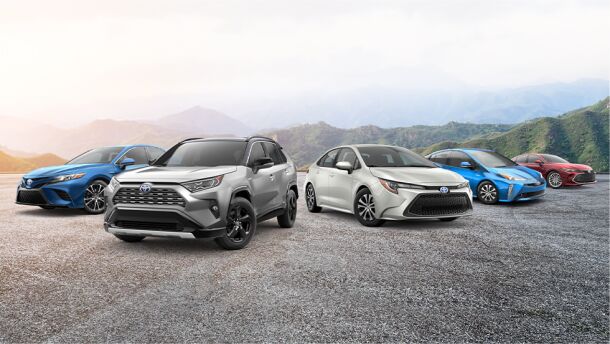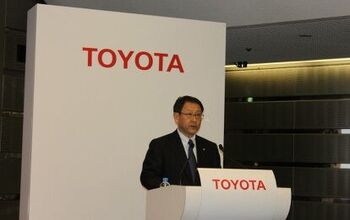Toyota Financial Results for 2021 Revealed
Last week, Toyota financial results for the fiscal year that ended March 31st were announced. Vehicle sales totaled 7,646,000, a decrease of 1,309,000 units, or a little less than 15 percent compared to the previous fiscal year.
Net revenue was $256.7 billion, an 8.8 percent decrease. Operating income decreased from $22.6 billion to $20.7 billion, while income before taxes amounted to $27.6 billion. Net income was up from $19.2 billion to $21.1 billion.
North American sales of 2,313,000 were down 400,000 from the year prior, while operating income rose by $866 million to $3.4 billion.
In Japan, Toyota sold 2,125,000 units, 115,000 fewer than in 2020. Here, operating income dropped by $4.1 billion to $10.8 billion.
Vehicle sales in Europe declined 70,000 units to 959,000, while operating income dropped $183.9 million to $1.0 billion.
Asian sales of 1,222,000 units fell by 378,000, while income rose $535.8 million to $4.1 billion.
Other regions totaled 1,027,000 vehicles, a 345,000 downturn. Operating income fell $106.6 million to $611.3 million.
Fiscal year predictions for 2022 are for a 13 percent increase to 8.7 million vehicles.
Net revenues would rise to $285.7 billion, while operating income rebounds to $23.8 billion. Net income before taxes will go up to $29.6 billion, and net income will advance to $21.9 billion.
Toyota financials aside, the company used this stage to address carbon neutrality in a prepared statement by Chief Digital Officer, James Kuffner. Toyota’s commitment is to achieving 100 percent carbon neutrality by 2050 or sooner, Kuffner stated.
Zero CO2 emissions throughout manufacturing, transporting, operating, fueling or charging, and recycling and disposing of vehicles is the goal.
Toyota offers a lineup of 55 electrified vehicles (EV) worldwide. Combined EV sales volume is more than 2 million vehicles per year.
Toyota’s total cumulative carbon emissions reduction has been 140 million tons over 20 years, equal to removing 1.5 million passenger vehicles every year.
Toyota will introduce 15 battery electric vehicle models globally by 2025, including seven recently-announced Toyota bZ models.
This is in addition to expanding and improving their lineup of hybrid electric vehicles (HEVs), plug-in hybrid vehicles (PHEVs), and fuel cell electric vehicles (FCEVs).
Toyota will make investments in new battery technology, such as solid state batteries, to support these products.
More than 1.4 billion vehicles are in operation worldwide, most with internal combustion engines (ICE). Toyota wants to clean up the world’s ICE vehicle fleet that will still be running for the next 10-15 years. I don’t foresee giving up my gas-powered vehicles as part of any clean-up effort, do you?
[Image: Toyota]
With a father who owned a dealership, I literally grew up in the business. After college, I worked for GM, Nissan and Mazda, writing articles for automotive enthusiast magazines as a side gig. I discovered you could make a living selling ad space at Four Wheeler magazine, before I moved on to selling TV for the National Hot Rod Association. After that, I started Roadhouse, a marketing, advertising and PR firm dedicated to the automotive, outdoor/apparel, and entertainment industries. Through the years, I continued writing, shooting, and editing. It keep things interesting.
More by Jason R. Sakurai
Latest Car Reviews
Read moreLatest Product Reviews
Read moreRecent Comments
- 3-On-The-Tree My 2009 C6 corvette in black looks great when it’s all washed and waxed but after driving down my 1.3 mile long dirt road it’s a dust magnet. I like white because dust doesn’t how up easily. Both my current 2021 Tundra and previous 2014 Ford F-150 3.5L Ecobomb are white
- Bd2 Would be sweet on a Telluride.
- Luke42 When will they release a Gladiator 4xe?I don’t care what color it is, but I do care about being able to plug it in.
- Bd2 As I have posited here numerous times; the Hyundai Pony Coupe of 1974 was the most influential sports and, later on, supercar template. This Toyota is a prime example of Hyundai's primal influence upon the design industry. Just look at the years, 1976 > 1974, so the numbers bear Hyundai out and this Toyota is the copy.
- MaintenanceCosts Two of my four cars currently have tires that have remaining tread life but 2017 date codes. Time for a tire-stravaganza pretty soon.


































Comments
Join the conversation
"So, students, we see that Toyota's global volume dropped by ~15 percent while Revenue only dropped by ~9 percent. What does this tell us about revenue per unit? Yes Mary Barra, you have the answer? Jim Farley, I see you nodding furiously in the first row, but let's let Mary answer this time. Yes Jim, Platinum Trim has amazing margins - right - yes, Jim." "Rick Wagoner, hey been awhile, thanks for popping in but no, the answer is not 'Market Share' - are you even registered for this class?" "And then we see that Europe is barely worth the trouble... oh - Carlos Tavares - you disagree?"
Is there anything Toyota cannot do?